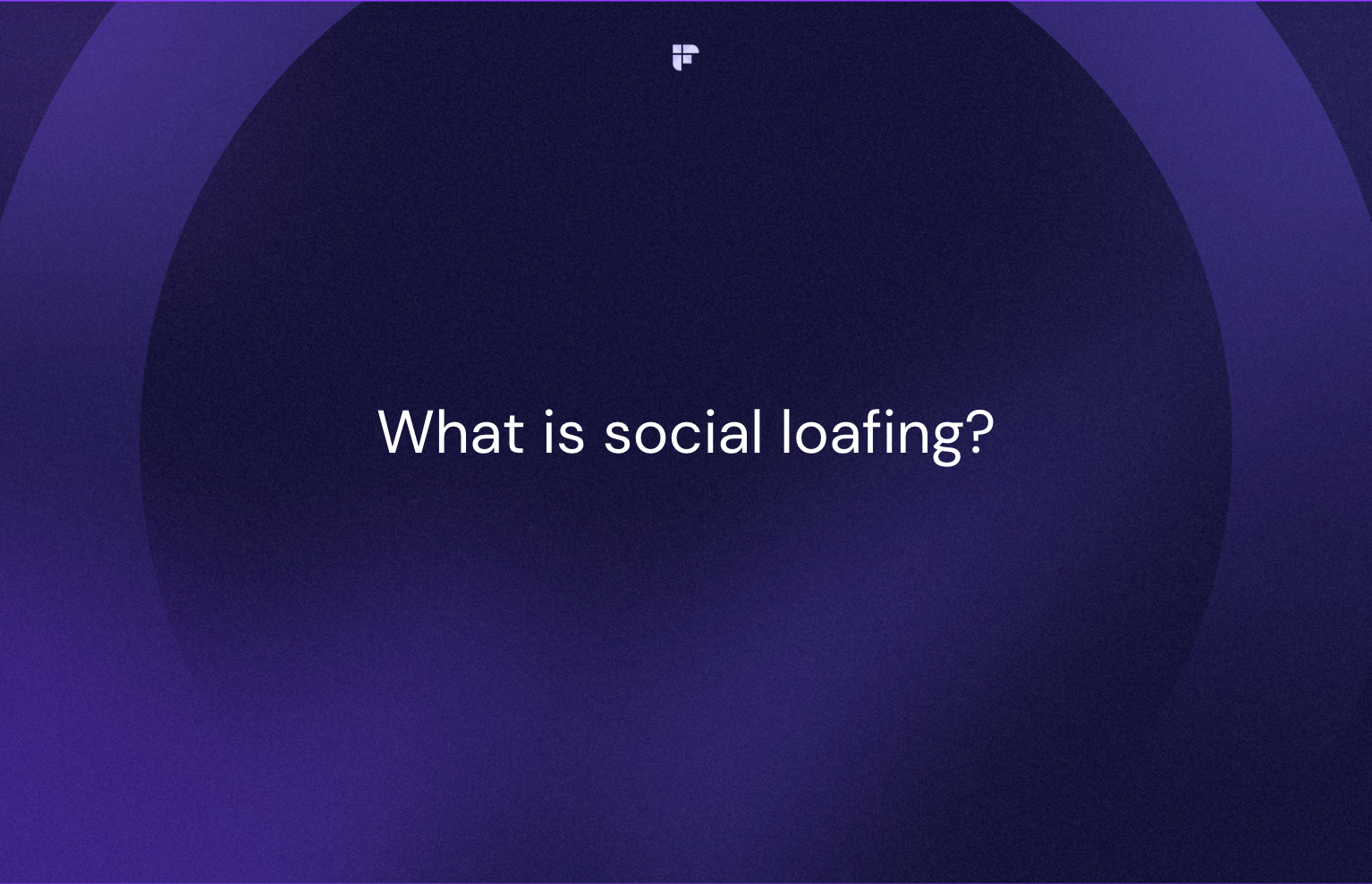Have you ever been part of a group project where you felt like you were doing all the work while others were coasting along? This question might take you back to high school, or you may be experiencing this right now in the workplace.
Whether in school or at work, these situations have the same explanation – social loafing.
In this article, we'll explore what social loafing is, how it originated, its primary reasons, and how to avoid it in the workplace.
What is social loafing?
Social loafing is when individuals exert less effort in a group setting than they would if working alone. This behavior occurs more often when individual contributions, such as group projects, government task forces, musical orchestras, juries, or even team sports, cannot be easily identified or evaluated.

When it comes to group projects in the workplace, social loafing can occur for several reasons. Some employees may feel their role in the project is not critical or are not as qualified to handle specific tasks. Others may believe their contributions will not be recognized or rewarded, decreasing motivation and effort.
According to a 1993 meta-analytic review by Karau and Williams, a significant finding stated that the effort individuals exert on collaborative tasks depends on the outcome's value. So, if employees feel their contributions to a group project will provide little significance, their motivation to try will diminish.
Social loafing can lead to serious consequences. Once team members have low motivation and don't work hard to achieve results, the overall performance decreases. This could lead to a fall in the quality of work, affecting not just one team but the entire company.
What is social loafing in psychology?
It all started with Max Ringelmann, a French agricultural engineer whose research represents some of the earliest in social psychology. His preliminary studies measured the force exerted by men pulling on a rope alone and in groups.

Ringelmann found that as the size of the group increased, the average amount of force exerted by each participant decreased. He found similar results when asking participants to push a crossbar connected to a cart. This group performance phenomenon became known as the Ringelmann effect.
More studies emerged, validating Ringelmann's findings. Researchers determined that individuals are more likely to loaf when working on tasks in a group versus alone, leading to the updated term, social loafing.
Top reasons for social loafing in psychology
Many of us have been in these exact situations throughout our lives, wondering why some members don't take on as much work as others. But why does this happen?
While social loafing can occur in many different contexts, it is particularly prevalent when individual contributions cannot be easily evaluated or identified.
Here are some of the top reasons why social loafing occurs:
1. Group size
When discussing reasons behind social loafing, group size is usually at the top of the list. A study that reexamined the Ringelmann effect found that the likelihood of social loafing increased as group size increased.

Similarly, in the meta-analysis by Karau and Williams mentioned earlier, group size was one of their most prevalent findings. They concluded that social loafing occurred more often in larger groups.
2. Lack of accountability
Accountability is a crucial component of effective teamwork in the workplace. When team members are held accountable for their contributions to a project, they are likelier to put forth their best effort and take ownership of their work.
On the other hand, when individuals feel that their contributions to the group cannot be evaluated or measured, they are more likely to engage in social loafing.
3. Reduced motivation
Group work can sometimes reduce individual motivation, particularly if members feel their efforts will not be recognized or appreciated. Research on social loafing has highlighted the importance of motivation, or the lack thereof, in influencing individuals' efforts in a group task.
A review of social loafing and motivation found that motivation emerged as a significant factor in preventing social loafing and promoting better performance in group settings. Therefore, team leaders who prioritize building group members' motivation will see lower levels of social loafing.
4. Diffusion of responsibility
In larger groups, individuals may feel less responsible for the project's overall outcome, as there are more people to share the workload. For instance, a marketing team has to create a promotional campaign for a new product launch. The team comprises 20 members, and each member has a task assigned to them.

Some of the tasks are similar to others, but the team did not discuss the specifics of each. As the project progressed, members began taking over other responsibilities, neglecting their own, and incorrectly assuming which task belonged to who.
This diffusion of responsibility made team members feel less responsible for their assignments because they assumed others would take the role.
5. Group cohesion
While group cohesion can benefit collaboration and teamwork, it can also lead to social loafing if individuals feel that their efforts are not necessary for the group's overall success. It is especially prevalent when individuals think their group identity is more important than theirs.
6. Task complexity
Individuals may be more likely to engage in social loafing if they see tasks as complex or challenging. They may not feel capable of completing it alone, especially when it requires specialized skills or knowledge.
Examples of social loafing
Let's look at some examples of social loafing in the workplace.
1. Group projects
Group projects are common in the workplace and can often suffer from social loafing. For instance, in a group project where team members are responsible for writing a report, some members may not contribute much, assuming that others will take care of the work. The result could be a poorly written or incomplete report.
2. Conference calls
Conference calls have transformed workplaces and become an integral part of remote communication. However, when team members are not held accountable for their contributions, conference calls could become a demonstration stage for social loafing. Some team members may not actively participate, contribute less, or provide minimal input to the discussion.

3. Customer service
Social loafing can also manifest in customer service, where a team of representatives is responsible for answering customer phone calls. In this setting, some team members may not take their roles seriously, leading to negative outcomes such as customers being left on hold for extended periods or receiving subpar customer service.
What is the key to reducing social loafing in groups?
Social loafing can be challenging in any group or team setting and particularly problematic in the workplace--not a scenario that any team leader strives to achieve.
But the good news is there are several strategies that leaders can use to reduce social loafing and encourage greater accountability, collaboration, and motivation in their teams.
Clarify roles and responsibilities
A common reason social loafing occurs is that team members are unclear about their roles and responsibilities. To reduce the phenomenon, leaders should clearly define the expectations for each team member and ensure they understand everything.
For example, use an AI notetaker for your online meetings to record, summarize, and transcribe every conversation, easily follow up on tasks, and outline specific goals, deadlines, and metrics.

Try Fireflies for free!
Also, identify the resources and support team members need to achieve their objectives.
Encourage open communication
Leaders should encourage team members to communicate openly and honestly with one another and provide opportunities for feedback and collaboration. This can build trust and a sense of shared responsibility among team members and foster a more collaborative and supportive work environment.
When an open communication style is accepted, team members are more likely to admit when they are wrong, discuss mistakes, and learn from experiences.
Set goals and incentives
A lack of motivation is a common driver of social loafing. By establishing specific targets and rewards for achieving them, leaders can motivate team members to work harder and take greater ownership of their responsibilities.

It can be financial incentives, recognition, praise, promotions or career advancement opportunities, or other meaningful and motivating rewards for team members.
Provide regular feedback and support
Regular feedback and support can reduce social loafing by providing team members with the guidance and resources they need to succeed. Leaders should give frequent feedback on performance, offer to coach and mentor to help team members develop their skills and provide access to training and other resources to support their professional growth and development.

Hold team members accountable
Establish clear expectations for performance, monitor progress against goals and targets, and hold team members accountable for meeting their responsibilities. Do regular check-ins, performance or year-end reviews, and other tracking and measuring performance mechanisms.
One effective approach is to break down larger projects into smaller, more manageable tasks that you can assign to individual team members. This can promote accountability and ensure that each team member is actively engaged in the project.
Conclusion
Social loafing could become a major disruption in the workplace. So, whether you lead a team or are a team member yourself, keep these strategies in mind. It'll help you prevent social loafing from taking hold and achieve greater success in your workplace.
Remember, teamwork makes the dream work only when everyone is fully engaged and motivated to give their best effort.
This is a guest post by Nino Abdaladze







